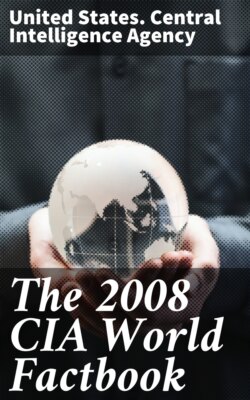Читать книгу The 2008 CIA World Factbook - United States. Central Intelligence Agency - Страница 145
На сайте Литреса книга снята с продажи.
BHD
ОглавлениеExchange rates:
Bahraini dinars (BHD) per US dollar - 0.376 (2007), 0.376 (2006), 0.376 (2005), 0.376 (2004), 0.376 (2003)
Communications
Bahrain
Telephones - main lines in use:
194,200 (2006)
Telephones - mobile cellular:
1.116 million (2007)
Telephone system:
general assessment: modern system domestic: modern fiber-optic integrated services; digital network with rapidly growing use of mobile-cellular telephones international: country code - 973; landing point for the Fiber-Optic Link Around the Globe (FLAG) submarine cable network that provides links to Asia, Middle East, Europe, and US; tropospheric scatter to Qatar and UAE; microwave radio relay to Saudi Arabia; satellite earth station - 1 (2007)
Radio broadcast stations:
AM 2, FM 3, shortwave 0 (1998)
Radios:
338,000 (1997)
Television broadcast stations:
4 (1997)
Televisions:
275,000 (1997)
Internet country code:
.bh
Internet hosts:
2,621 (2008)
Internet Service Providers (ISPs):
1 (2000)
Internet users:
250,000 (2007)
Transportation
Bahrain
Airports:
3 (2007)
Airports - with paved runways:
total: 3 over 3,047 m: 2 1,524 to 2,437 m: 1 (2007)
Heliports:
1 (2007)
Pipelines:
gas 20 km; oil 52 km (2007)
Roadways:
total: 3,498 km paved: 2,768 km unpaved: 730 km (2003)
Merchant marine:
total: 9 by type: bulk carrier 4, container 4, petroleum tanker 1 foreign-owned: 6 (Kuwait 5, UAE 1) (2008)
Ports and terminals:
Mina' Salman, Sitrah
Military
Bahrain
Military branches:
Bahrain Defense Forces (BDF): Ground Force (includes Air Defense),
Naval Force, Air Force, National Guard
Military service age and obligation:
17 years of age for voluntary military service; 15 years of age for NCOs, technicians, and cadets; no conscription (2008)
Manpower available for military service:
males age 16–49: 210,938 females age 16–49: 170,471 (2008 est.)
Manpower fit for military service:
males age 16–49: 171,536 females age 16–49: 142,714 (2008 est.)
Manpower reaching militarily significant age annually:
male: 6,543 female: 6,429 (2008 est.)
Military expenditures:
4.5% of GDP (2006)
Transnational Issues
Bahrain
Disputes - international:
none
Trafficking in persons:
current situation: Bahrain is a destination country for men and women trafficked for the purposes of involuntary servitude and commercial sexual exploitation; men and women from Africa, South Asia, and Southeast Asia migrate voluntarily to Bahrain to work as laborers or domestic servants where some face conditions of involuntary servitude such as unlawful withholding of passports, restrictions on movements, non-payment of wages, threats, and physical or sexual abuse; women from Thailand, Morocco, Eastern Europe, and Central Asia are trafficked to Bahrain for the purpose of commercial sexual exploitation tier rating: Tier 2 Watch List - Bahrain is on the Tier 2 Watch List for failing to show evidence of increased efforts to combat human trafficking, particularly efforts that enforce laws against trafficking in persons, and that prevent the punishment of victims of trafficking; during 2007, Bahrain passed a comprehensive law prohibiting all forms of trafficking in persons; the government also established a specialized anti-trafficking unit within the Ministry of Interior to investigate trafficking crimes; however, the government did not report any prosecutions or convictions for trafficking offenses during 2007, despite reports of a substantial problem of involuntary servitude and sex trafficking (2008)
This page was last updated on 18 December, 2008
======================================================================
@Bangladesh
Introduction
Bangladesh
Background:
Europeans began to set up trading posts in the area of Bangladesh in the 16th century; eventually the British came to dominate the region and it became part of British India. In 1947, West Pakistan and East Bengal (both primarily Muslim) separated from India (largely Hindu) and jointly became the new country of Pakistan. East Bengal became East Pakistan in 1955, but the awkward arrangement of a two-part country with its territorial units separated by 1,600 km left the Bengalis marginalized and dissatisfied. East Pakistan seceded from its union with West Pakistan in 1971 and was renamed Bangladesh. A military-backed caretaker regime suspended planned parliamentary elections in January 2007 in an effort to reform the political system and root out corruption; the regime has pledged new democratic elections by the end of 2008. About a third of this extremely poor country floods annually during the monsoon rainy season, hampering economic development.
Geography
Bangladesh
Location:
Southern Asia, bordering the Bay of Bengal, between Burma and India
Geographic coordinates:
